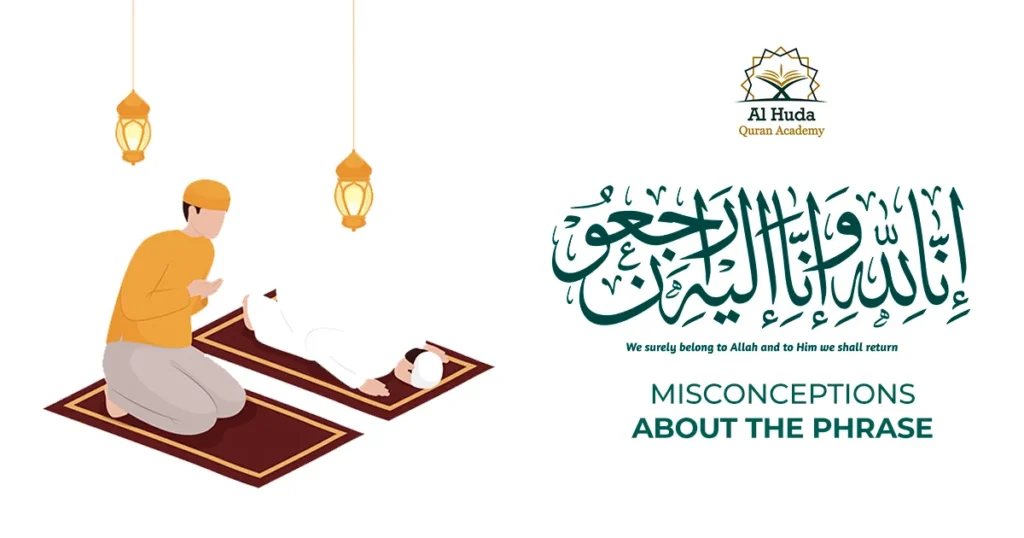At the time of any tragedy, loss, or even death, Muslims say, “Innalillahiwainnailaihirojiun.” What does this phrase mean, and what does it hold for Islam? We will uncover its legal delineation—and explore its everyday application, spiritual meaning, Quranic settings, and Islamic history while uncovering innalillahiwainnailaihirojiun meaning in depth. Furthermore, we will clarify common myths and explain how to convey the essence of these profound words to children and new Muslims in a way that resonates with understanding and compassion.
Continue reading to understand “Innalillahiwainnailaihirojiun” and its unmet relevance to the trials most people face.
Where It Comes From
“Innalillahiwainnailaihirojiun” comes from the Quran, especially Surah Al-Baqarah (2:156). This announcement captures the essential Islamic precept of ikhlas (sincerity), tawakkul (belief), and rida (popularity of Allah’s decree). It encapsulates the belief in Islam which states that the whole thing in lifestyles consisting of our existence, without any unqualified exceptions, belongs to Allah.
Common Times Muslims Use It
In Islam, the phrase is largely associated with death announcements. Nonetheless, it is not restricted to moments of sadness. It covers any form of hardship, which can be as small as losing one’s belongings or as large as losing someone dear. Understanding the innalillahiwainnailaihirojiun meaning helps Muslims find comfort and strength during trying times, as it serves multiple purposes—most importantly, as an expression of surrender to the will of Allah.
“Innalillahiwainnailaihirojiun” – The Exact Translation

This phrase translates to “Indeed, we belong to Allah, and indeed to Him we return.”
Word-by-Word Breakdown
The phrase “Innalillahiwainnailaihirojiun” interprets to “Indeed, we belong to Allah, and certainly, to Him we shall return,” reflecting ultimate submission and acknowledgment of Allah’s sovereignty. This expression is often recited in times of loss or hardship, serving as a reminder of our temporary existence and the certainty of returning to our Creator. To truly grasp the innalillahiwainnailaihirojiun meaning, it helps to understand the depth and spiritual strength it offers—conveying patience, faith, and trust in Allah’s divine will.
- “Inna” (إِنَّا): “Indeed” or “verily,” an affirmation of truth.
- “Lillahi” (لِلَّهِ): “To Allah,” establishing ownership and divine connection.
- “Wa inna ilayhi” (وَإِنَّا إِلَيْهِ): “And indeed to Him,” reiterating the relationship between humans and Allah.
- “Raji’un” (رَاجِعُونَ): “We shall return,” emphasizing accountability and ultimate reunion with Allah in the Hereafter.
What Does It Mean Spiritually?
At its core, the innalillahiwainnailaihirojiun meaning is a powerful reminder of our temporary existence in this world and our inevitable return to Allah. It reflects a deep acceptance of His wisdom and a profound trust in His greater plan. Spiritually, it grounds the believer in humility and reliance on Allah, especially during times of hardship and loss.
Quranic Reference and Context
This phrase serves as a profound acknowledgment of life’s impermanence and Allah’s ultimate authority.
Surah Al-Baqarah and Verse 156
The phrase appears in verse 156 of Surah Al-Baqarah, which states:
“Who, when disaster strikes them, say, ‘Indeed we belong to Allah, and indeed to Him we will return.'” (2:156).
This verse is part of a set of verses that describe the righteous believers who endure patience during trials.
Why This Verse Is So Powerful
The power of this verse lies in its universal applicability. By affirming Allah’s ownership over everything, it helps Muslims cope with hardships by reminding them that worldly losses are a test, not a punishment. The innalillahiwainnailaihirojiun meaning reflects a deep spiritual truth — that everything we have is a trust from Allah, and to Him we all ultimately return. The ultimate reward for patience in the face of such trials is immense in the Hereafter.
When Should Muslims Say It?
During hardships and loss, Muslims are advised to acknowledge Allah’s command by reciting this phrase.
During Death and Tragedy
“Innalillahiwainnailaihirojiun” Is often recited when one comes across news of someone’s death. This phrase captures surrender to Allah’s will while accepting life’s fleeting nature.
Beyond Death – Other Life Challenges
The saying is applied during difficult times such as financial strife, health struggles, or even misplacing belongings. This saying again reinforces the idea that everything is temporary except Allah.
Spiritual Significance in Islam
It highlights tawakkul, trust in Allah’s plan, and also reminds one of the temporary nature of existence.
A Reminder of Our Return to Allah
This captures well the basic belief of Islam that we are all on a sojourner journey on earth and the destination is none other than Allah. It reassures in times of trial because there sure is wisdom behind the scenes.
Strength in the Face of Loss
Reciting this phrase motivates the Muslims to adopt sabr. This saying surely strengthens their belief the way out is always there, but the perspective of Allah on compensating every single loss will come in different easter eggs.
“Innalillahiwainnailaihirojiun” in Daily Life

“Submission to Allah’s will and finding peace in His divine plan” Innalillahiwainnailaihirojiun is daily life.
It’s More Than a Funeral Phrase
Innalillahiwainnailaihirojiun is universal, even though it’s commonly recited to memorialize the dead. One might even go so far as to proclaim it in moments of aggravation like shattering a glass or missing public transit.
A Heartfelt Supplication
In their lifetime nag, this doesn’t lose its poignancy. The phrase serves as reciting the testament. It’s a symbol of giving over pain and panic to Allah in His wisdom and mercy.
The Emotional and Mental Healing It Offers
It is an articulation that aids in emotional relief and strengthens belief in the higher powers of God.
Letting Go with Faith
Saying “Innalillahiwainnailaihirojiun” is an event of submitting oneself to Allah’s grand design for earthly life. It assists Muslims in letting go of feelings of rage or hopelessness towards circumstances, moving their focus to acceptance and belief.
Finding Peace in Difficult Moments
The expression calms down the mind during stormy times. While reciting it, Muslims bring to their heads that which is more powerful than them, Allah swt and helps them attain mental and emotional peace during turbulence.
Misconceptions About the Phrase

It is a submission, trust, and hope phrase regarding the divine plan of Allah.
Not Just for Death Announcements
A common misunderstanding is that this phrase is only applicable for announcing someone’s death. However, it is relevant for any occasion of loss, great or small.
Understanding Its True Usage
Another misconception is that the phrase is merely said as a ritual without deeper sentiment. On the contrary, its usage is fundamental to Islamic theology and offers a profound affirmation of faith in practice.
Teaching This to Children and New Muslims
Teaching this expression aids in grasping faith and accepting challenges in life.
Making It Easy to Understand
For children and new Muslims, teaching this saying starts with elucidating its translation and meaning in very basic terms. With a clear understanding of its aims, they will be able to implement it into their lives.
Instilling a Sense of Trust in Allah
Teaching this phrase to the younger generation creates a very useful practice of trusting Allah when difficulties arise. They learn that the source of strength is not materialistic belongings, but the bond with the Creator.
A Phrase of Power, Faith, and Surrender
Innalillahiwainnailaihirojiun” captures a phrase far beyond mere words; faith, trust, as well as full surrender to Allah is contained within. For those seeking comfort and clarity, understanding the innalillahiwainnailaihirojiun meaning reveals its deep spiritual power. In the face of loss or even light daily inconveniences, this phrase serves as powerful reassurance—everything is within Allah’s domain, and Allah is the root of peace and cure.
Incorporating this phrase into monumental milestones as well as everyday activities has the potential to reshape one’s mentality and bolster the pain experienced in life, as well as provide meaning to life itself.
If this blog widens your interpretation of “Innalillahiwainnailaihirojiun”, consider sharing this with people who may benefit from the reminder.
Frequently Asked Questions (FAQs)
Correct, this can, and should, be said during any loss, difficulty, or challenge as a reminder of Allah’s wisdom.
It is not obligatory to say, but it is certainly encouraged as a sign of sabr and iman.
Absolutely! It aids children in connecting to Allah and finding tranquility and peace from a young age.

